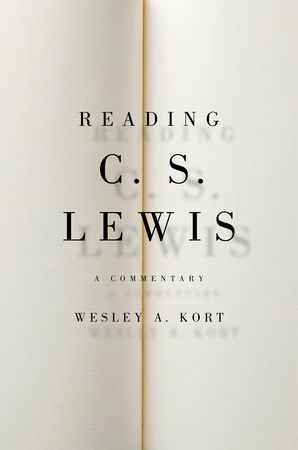
Reading C.S. Lewis: A Commentary, Wesley Cort. New York: Oxford University Press, 2016 (review based on pre-publication galley).
Summary: This book provides an undogmatic look at C.S. Lewis, considering the influences upon his life and writing, and a commentary on Lewis’s major Christian works.
Fans of C.S. Lewis are legion and they have generated a plethora of books on aspects of Lewis’s work. Critics, who, at root, believe Lewis Christianity fatally compromised his work, are also out there. What Wesley Cort tries to do is consider Lewis’s major works from a more neutral perspective, examining the personal and scholarly influences that informed his writing, and giving us a commentary on the major works that made up his Christian writing.
Apart from a Preface that explains his aims, the book is organized around three sections that correspond to what Kort sees are the three major aspects of Lewis’s “project.” The first of these concerned Lewis’s philosophical anthropology and moral theory and includes commentaries on Surprised by Joy, The Screwtape Letters, Mere Christianity, and a concluding chapter titled “Some Reasonable Assumptions”. We see in this Lewis at his reasoned best, but also the role experience and imagination play in his conversion and life, themes Kort repeatedly teases out.
The second part concerns Lewis’s cultural critique of modernity, which includes the Space Trilogy (Out of the Silent Planet, Perelandra, and That Hideous Strength), along with his prose work outlining similar ideas, The Abolition of Man. The third part then turns to the working out of Lewis’s ideas as applied principles of moral action, in The Chronicles of Narnia (he considers four of seven of these), and The Four Loves.
Kort interweaves outlines of these texts and their major themes and exploration of the thought currents in Lewis’s time that shaped these works–romanticism, philosophical idealism, the rise of scientism, and an early form of post-modernism, which Lewis presciently anticipated in The Abolition of Man and the Space Trilogy.
It was tempting to want to read Lewis’s works side by side with Kort’s commentary, which is probably the best use of any commentary. I found Kort’s work illuminating in various ways (for example Lewis’s spatial orientation and love of big sprawling houses). The themes he used to group Lewis’s books were interesting as was his delineation of the place of reason, experience, and imagination in Lewis’s writing.
Perhaps for reasons of themes and space he focuses on Lewis’s most popular works. But does this give us the truest reading of Lewis? It seems particularly striking that works like his commentary on the psalms, Letters to Malcolm, and A Grief Observed are excluded, as well as the work Lewis considered his best, Till We Have Faces. Nor do we really have any consideration of Lewis’s scholarly work, and its connection to these more popular works. Perhaps that is too large a “project”.
For the person wanting to know more of Lewis, I would urge reading his work first. Had I read Kort first, I might not have read Lewis. Kort is prosaic where Lewis sparkles. Perhaps this is the danger of all such works, and particularly one striving for a certain distance from adoration or vituperation. Yet perhaps what Kort’s work marks is a critical reappraisal of Lewis, neither adoring or denigrating, but understanding and weighing his ideas both for their impact in his time and our own. No matter what one thinks of Lewis, he occupied a significant place in twentieth century letters and scholarship and as a public intellectual. And perhaps such careful treatment might lead to more balanced assessment by both his fans and critics.
Disclosure of Material Connection: I received this book free from the publisher as an ebook via Netgalley. I was not required to write a positive review. The opinions I have expressed are my own. I am disclosing this in accordance with the Federal Trade Commission’s 16 CFR, Part 255 : “Guides Concerning the Use of Endorsements and Testimonials in Advertising.”
Editor’s Note: Thank-you to Bob Trube for sharing his reviews with Emerging Scholars! Bob first posted the above review on Bob on Books. ~ Thomas B. Grosh IV, Associate Director, Emerging Scholars Network
Bob Trube is Associate Director of Faculty Ministry and Director of the Emerging Scholars Network. He blogs on books regularly at bobonbooks.com. He resides in Columbus, Ohio, with Marilyn and enjoys reading, gardening, choral singing, and plein air painting.

Leave a Reply